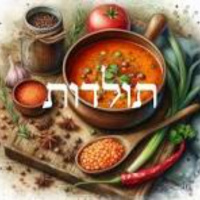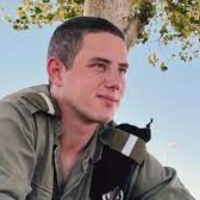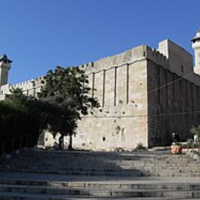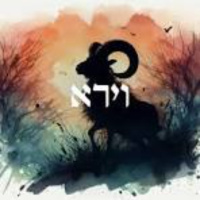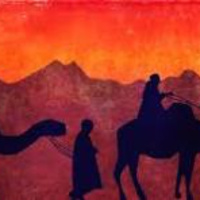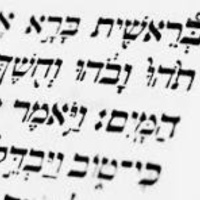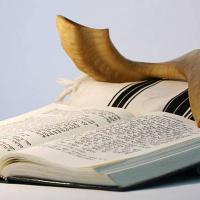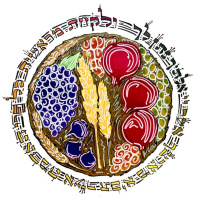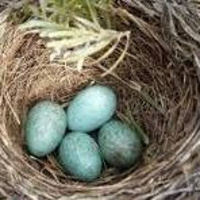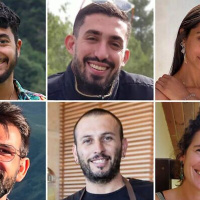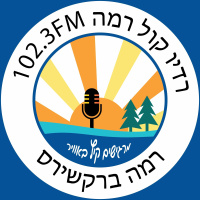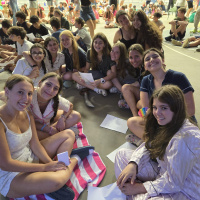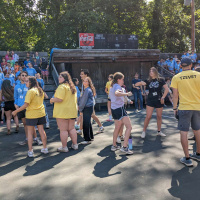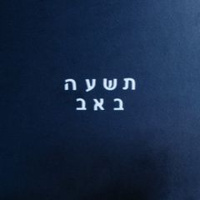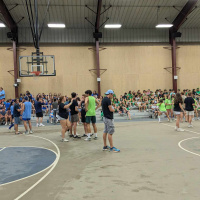Informações:
Sinopse
Broadcasting from Camp Ramah in the Berkshires. We are the soundtrack for each summer! Our air is filled with shows produced by and for the campers!LISTEN LIVE: http://KolRamah.us
Episódios
-
Parsha Talk Vayishlach 5785 2024
12/12/2024 Duração: 34minParashat Va-yishlach [Genesis 32:4–36:43] features the actions Jacob takes in preparation for his meeting with Esau after 20 years, the mysterious wrestling match with the מלאך [malakh, understood as a divine messenger or a human messenger], the actual meeting, the ravishing of Dinah [as Nahum Sarna entitles the episode], a theophany at Beth El, and the genealogy of Esau. It represents the concluding chapter for Isaac and Esau, as well as Deborah, the nurse of Rebecca, and Rachel, who dies shortly after giving birth to Benjamin, as he is renamed by his father. It was just Eliot and me this week. Jeremy is in Israel for the Rabbinical Assembly convention this week, but was under the weather, and thus unable to join us. We wish him a refu’ah sh’lemah, a speedy recovery, and look forward to next week when we hope that Jeremy is at full strength, as are we! Our conversation focused on the opening chapter of the parashah, as we sought out the meaning in Jacob’s preparation, and struggled to understand the sign
-
Parsha Talk Toldot 5785 2024
04/12/2024 Duração: 37minParsha Talk with Rabbis Eliot Malomet, Barry Chesler and Jeremy Kalmanofsky. Parashat Toldot [Genesis 25:19-28:9] is the sixth of the 12 weekly Torah readings in the Book of Genesis. With the death of Abraham and Ishmael last week, the story this week concentrates on the family of Isaac and some of the key events in the life of Isaac: the birth of his twin sons, the wife-sister story in the 2nd generation, and the deceiving of Isaac by Jacob [and Rebecca] to acquire the blessing of the first-born for Jacob. Our conversation concentrated on the story not directly related to Isaac, which is the acquisition of the right of the first-born for Jacob by the sale of lentil soup. The word for blessing [ברכה, b’rakhah] and right of the first-born [בכורה, b’khorah] sound nearly the same, and certainly the stories are two be seen together. Whereas Jacob is the main actor in the sale of the birth-right, in the acquisition of the blessing, Jacob is portrayed as a passive character, first driven by his mother Rebecca,
-
parsha talk Vayeitze 5785 2024
04/12/2024 Duração: 37minParsha Talk, with Rabbis Eliot Malomet, Barry Chesler and Jeremy Kalmanofsky. Parashat Va-yetze [Genesis 28:10-32:3] was my Bar Mitzvah parashah many, many years ago! It opens with Jacob leaving Be’ersheva for Haran, fleeing for his life or looking for a wife. It ends with Jacob on his way back to the land of his birth. A lot happens between those two events, including his marriage to the sisters Leah and Rachel, and the birth of his first 11 sons and his daughter. Our conversation focused mostly on the beginning scene and the scene at the well, though we touched upon some other matters as well as the well. Please let us know what you think. This week’s show is dedicated to the memory of Omer Neutra z”l, my former student, whose death on October 7, 2023 was announced earlier in the week. His body has been held hostage in Gaza since then. We continue to be mindful of the other hostages, may they be speedily returned to their families, and the soldiers serving in the Israel Defense Forces, may they be rem
-
parsha talk Haayyei Sarah 5785 2024
21/11/2024 Duração: 37minParsha Talk with Rabbis Eliot Malomet, Barry Chesler and Jeremy Kalmanofsky. Parashat Chayyai Sarah [Genesis 23:1-25:18] begins with the death of Sarah and the acquisition of the Cave of Makhpelah from Efron the Hittite. This sale and consequent burial of Sarah establishes Abraham’s claim to the land, for he now is the legal owner of a plot of land. The largest section of the parashah is devoted to finding a wife for Isaac. Avraham sends his servant, whom the rabbis identify as Eliezer, back to his ancestral homeland to find a wife amongst his kin, with the proviso that the servant may bring the woman back to Canaan, but under no circumstances is he to take Isaac to the ancestral homeland. This story, and in particular the oath with which Avraham sends off his servant, provides the basis for our conversation this week. Chapter 25 narrates the subsequent marriage of Avraham to Keturah, whom the rabbis identify as Hagar, and the birth of 6 more sons. In turn, Avraham dies and is buried, and Ishmael dies a
-
parsha talk Vayera 5785 2024
20/11/2024 Duração: 36minParsha Talk with Rabbis Eliot Malomet, Barry Chesler and Jeremy Kalmanofsky. Parashat Va-yera [Genesis 18:1-22:24] is filled with interesting material: the announcement of the birth of Isaac, Abraham’s conversation with God about the fate of Sodom & Gomorrah, the second wife-sister story, the banishment of Ishmael and Hagar, and the Binding of Isaac [these latter two which we read on Rosh Hashanah]. Our focus this week was on the opening scene and what we can discover about the relationship between Abraham and Sarah. We did not move far from this topic and hope you will find that we had interesting things to say! On the 404th day of the war, we continue to be mindful of the hostages, may they be returned speedily to their families, and the soldiers defending Israel as members of the Israel Defense Forces, may they be removed from harm’s way. Shabbat Shalom.
-
parsha talk Noah 5785 2024
10/11/2024 Duração: 37minParsha Talk with Rabbis Eliot Malomet, Barry Chesler and Jeremy Kalmanofsky. Parashat No’ach [Genesis 6:9-11:32], the second parashah in the Book of Genesis, primarily deals with the flood, the great cataclysm in which God destroys the world he had so carefully created in the opening chapters of The Torah. Noah, in whom God has found favor, is instructed to build an ark and to enter it with his wife, his three sons and their wives, and representatives of all the land animals and birds [there is some disagreement about the actual numbers]. The world is then destroyed by a massive rainstorm which inundates the earth. The ark finds a resting spot on Mt. Ararat. At some point Noah is instructed to leave the ark, after which he makes sacrifices to God. The last chapters of the book include the repopulation of the earth with the mention of the descendants of Shem, Ham, and Japhet; the story of the Tower of Babel, and the 10 generations from Noah to Avram, setting the stage for Avram’s dramatic entrance next we
-
parsha talk Lekh Lekha 5785 2024
10/11/2024 Duração: 35minParsha Talk Lekh Lekha with Rabbis Eliot Malomet, Barry Chesler and Jeremy Kalmanofsky. For D'var Torah by Rabbi Barry Chesler visit https://www.facebook.com/profile.php?id=100014806476351
-
parsha talk Bereishit 5785 2024
30/10/2024 Duração: 37minParsha Talk Bereishit - with Rabbis Eliot Malomet, Barry Chesler and Jeremy Kalmanofsky. After the holidays of Sh’mini Atzeret and Simhat Torah [Thursday and Friday, October 24 and 25], we begin the annual Torah reading cycle with parashat Bereshit [Genesis 1:1-6:8]. What kind of world has God created for us and what is our particular role in it as human beings. We spent a fair amount of time trying to unpack the Cain and Abel story, which I have long found one of the stranger stories in the Torah. What exactly is its Torah? What is it designed to teach us? Give a listen and let us know what you think! As the war continues we remain mindful of the hostages, may they be speedily returned to their families, and the soldiers defending Israel as part of the Israeli Defense Force, may they be removed from harm’s way. As we conclude the holiday of Sukkot, may the sukkah of peace descend upon all troubled parts of the globe. Hag Sa’me’ah and Shabbat Shalom.
-
Parsha Talk Pre - Sukkot 5785 2024
16/10/2024 Duração: 36minParsha Talk with Rabbis Eliot Malomet, Barry Chesler and Jeremy Kalmanofsky. Tomorrow night [Wednesday, October 16, 2024] begins the holiday of Sukkot, known in Jewish tradition as z’man simchateinu, the time of our rejoicing. The concluding days, Thursday and Friday, October 24-25, are Sh’mini Atzeret and Simchat Torah. Every year, these latter days mark the end of the long holiday season, which may be said to have begun on the first day of the month of Elul, the month preceding Tishri, when the shofar is first blown in the morning service to announce the upcoming penitential season. This year, they also mark the date on the Hebrew calendar on which the October 7th War began. How does one find joy amidst such sorrow? We devoted our show this week to the holiday of Sukkot, discussing the question of how to celebrate in the wake of the war, as well as the symbolism of the sukkah and the 4 species [lulav, etrog, myrtle, and willow]. We will return to the weekly parashah next week, when the annual cycle beg
-
Parsha Talk Yom Kippur 5784 2824
11/10/2024 Duração: 36minParsha Talk with Rabbis Eliot Malomet, Barry Chesler and Jeremy Kalmanofsky. On this Yom Kippur edition of Parashah Talk we spend our time talking about Yom Kippur, Kol Nidrei, and forgiveness, among other things. Our hearts weigh heavily as we continue to think about and pray for the hostages in what is now their second year of captivity. May they be speedily returned to their families. May the soldiers in the Israel Defense Force be removed from harm’s way. May peace and quiet descend on all troubled places in the world in which we live. G’mar Hatimah Tovah. May your seal for the new year be one of goodness.
-
Parsha Talk Nitzavim Vayelek 5784 2024
01/10/2024 Duração: 39minParsha Talk with Rabbis Eliot Malomet, Barry Chesler and Jeremy Kalmanofsky. We are winding our way to the conclusion of our annual Torah Reading. This week’s parashah, Nitzavim-Va’yelekh [Deuteronomy 29:9-31:30] is the penultimate Shabbat reading. The following Shabbat, October 5, is Shabbat Shuvah, the Shabbat between Rosh Hashanah and Yom Kippur; that weekly reading, Ha’azinu, concludes the Shabbat weekly readings on the annual cycle here in the Diaspora. The final parashah, V-zot Ha-b’rakhah [Deuteronomy 33-34] is read on Simhat Torah, this year celebrated on Friday, October 25, 2024. It is a bittersweet celebration this year, as it marks the anniversary of the War in Israel on the Jewish Calendar. Our conversation focused on a few pesukim [sentences] found primarily [or entirely] in parashat Nitzanim [Deuteronomy 29:9-30:20]. In particular, we discussed the theme of t’shuvah, repentance as it is generally translated, or return, which is both relevant to the Torah Reading and the season of the year
-
Parsha Talk Ki Tavo 5784 2024
20/09/2024 Duração: 38minParsha Talk with Rabbis Eliot Malomet, Barry Chesler and Jeremy Kalmanofsky. Parashat Ki Tavo [Deuteronomy 26:1-29:8] features, among other things, the ritual of the first fruits and the description of a one-time event to take place in the Land of Israel where the Israelites will assemble 6 tribes each on 2 mountains [Ebal and Gerizim for those of you keeping score] for a ritual recitation of blessings and curses that will descend on the people and the land, depending on the behavior of the Israelites. The text of the first-fruits ritual whose earliest date was the holiday of Shavuot was incorporated by the rabbis as the heart of the Haggadah, the ritual recitation on Passover. We split our conversation between these two very different recitations as we sought to find meaning in them for today. We continue to be mindful of the hostages and the soldiers fighting in defense of the State of Israel. May the hostages be speedily returned to their families and the soldiers be removed from harm’s way. Shabbat Sh
-
Parsha Talk Ki Teitzei 5784 - 2024
13/09/2024 Duração: 39minParsha Talk with Rabbis Eliot Malomet, Barry Chesler and Jeremy Kalmanofsky . In the words of my friend and colleague Rabbi Eliot Malomet, Parashat Ki Tetze [Deuteronomy 21:10-25:19] is mitzvah dense, containing 74 out the 613 commandments the rabbis found in the Torah, well over 10%. In our conversations we tried to extract meaning from this welter of laws by thinking about the story or stories that might be embedded in them. Among the laws we actually discussed was the ben sorer u-moreh, the stubborn and rebellious son, and the command to erase Amalek from our memory. What would the Israelite listening to Moses make of all these laws? What are we to make of them today? As the war winds its way into its 12th month, we continue to keep in our hearts and minds the hostages who remain in Gaza, and the soldiers fighting in defense of the State of Israel. May the hostages be returned speedily to their families, and the soldiers removed from harm’s way. On this 24rd anniversary of 9/11, we also think of the
-
Parsha Talk Shoftim 5784 2024
06/09/2024 Duração: 35minParsha Talk with Rabbis Eliot Malomet, Barry Chesler and Jeremy Kalmanofsky. Parashat Shoftim [Deuteronomy 16:18-21:9] ordinarily provides a lot of material for conversation and discussion. On his JPS Torah Commentary, Jeffrey Tigay divides the parashah into two: Civil and Religious Authorities [16:18-18:22] and Judicial and Miltary Matters [19:1-21:9]. Given the events of the past week, we turned to the haftarah [Isaiah 51:12-52:12] rather than the Torah reading for the framework of our conversation. We continue to be mindful of the remaining hostages and their families, and the men and women who defend Israel as soldiers in the Israel Defense Force. May the remaining hostages be speedily returned to their loved ones; may the soldiers defending Israel be removed from harm’s way. This sad week we dedicate our conversation to the memory of the six hostages murdered in captivity. May their families be comforted together with all those who mourn in Zion. Shabbat Shalom..
-
Parsha Talk Re'eh 5784 2024
30/08/2024 Duração: 40minParsha Talk with Rabbis Eliot Malomet, Barry Chesler and Jeremy Kalmanofsky. Parashat Re’eh [Deuteronomy 11:26–16:17] is the fourth parashah in Deuteronomy. After a few introductory verses, the parashah begins the lengthy section Jeffrey Tigay entitles “The Laws Given in Moab”, which continues through the next few weeks to parashat Ki Tavo, read on September 21. Deuteronomy is perhaps best known for its commandment to centralize the cult in the Temple in Jerusalem, with the concomitant destruction of all the local sanctuaries. This centralization requires the reformulation of the holidays among other spheres of law. We spent some time discussing this, and the commandment to ושמחת, understood as to rejoice or to celebrate. This is the third of the third of the seven weeks of consolation following Tisha B’Av. Each of the haftarot for these seven shabbatot come from the book scholars call Second Isaiah. This week’s haftarah [Isaiah 54:11–55:5] includes the verse which is the basis for the midrash which con
-
Parsha Talk Ekev 5784 2024
23/08/2024 Duração: 38minWelcome to Parsha Talk with Rabbis Eliot Malomet, Barry Chesler and Jeremy Kalmanofsky.Parashat Eqev [Deuteronomy 7:12–11:25] is the third parashah in the Book of Deuteromony. Among its verses are the 7 species [8:8] which distinguish the Land of Israel, the verse [8:9] which is incorporated into the Grace after Meals and provides the halakhic [Jewish legal] basis for its recitation, and the 2nd paragraph of the Shema [11:13–21], with its theme of Reward and Punishment. Our conversation, as it often does, meanders from topic to topic. Among other things, we discussed the importance of the land and the differences between monotheism and paganism; we hope you enjoy it! We continue to be mindful of the hostages and their families, and the men and women who defend Israel as soldiers in the Israel Defense Force. May the hostages be speedily returned to their loved ones; may the soldiers defending Israel be removed from harm’s way. Shabbat Shalom.
-
Parsha Talk Vaethanan 2024 5784
16/08/2024 Duração: 37minParsha Talk with Rabbis Eliot Malomet, Barry Chesler and Jeremy Kalmanofsky. Parashat Va-etchanan [Deuteronomy 3:23-7:11] contains, among other passages, the second version of the 10 Commandments, as remembered by Moshe 40 years after they were given at Sinai [Exodus 20], and the first paragraph of the Shema, the great credal statement of Judaism, together with a pssage from next week [Deuteronomy 11:13-21, the 2nd paragraph], and a passage from Numbers [15:37-41, the 3rd paragraph]. In addition, there are a number of verses which have entered the Jewish liturgy, two in the Torah service, one in the special service of Simchat Torah, and one in the Aleinu, which for hundreds of years has been the concluding prayer of the 3 daily prayer services, and a passage which makes it into the 4 Questions of the Haggadah at the Passover Seder. Our conversation took up the pathos of Moshe, who is told in no uncertain terms he is to stop asking God to let him into the Promised Land. What is Moshe thinking about as he fas
-
-
Parsha Talk Devarim - Tisha B'av 2024 5784
09/08/2024 Duração: 37minParsha Talk with Rabbis Eliot Malomet, Barry Chesler and Jeremy Kalmanofsky. Parashat Devarim [Deuteronomy 1:1-3:22] opens the Book of Deuteronomy. It is a longstanding tradition to read this parashah on the Shabbat preceding Tisha B'Av, the Fast of the Ninth of Av, the day on which Jews commemorate the tragic events which have befallen us as a people. Most notably, the 9th of Av is the traditional day for the destruction of both the First and Second Temples; it is also said to be the day the people received the decree that they would not enter the Promised Land in response to the report about the land from.thevspies [see Numbers 13-14]. Our conversation considered how to besr describe Deuteronomy, is it a book of rebuke or a book of lamentation, which led us to discuss how the war affects our observance of Tisha B'Av this year. We continue to be mindful of the hostages and their families, and the men and women who defend Israel as soldiers in the Israel Defense Force. May the hostages be speedily ret
-
Yom Sport Closing Tekes 2024
05/08/2024 Duração: 27minThe two teams of Yom Sport present songs, cheers, and their banners. Congratulations to the blue team!!! Recorded by Amy Erlanger


